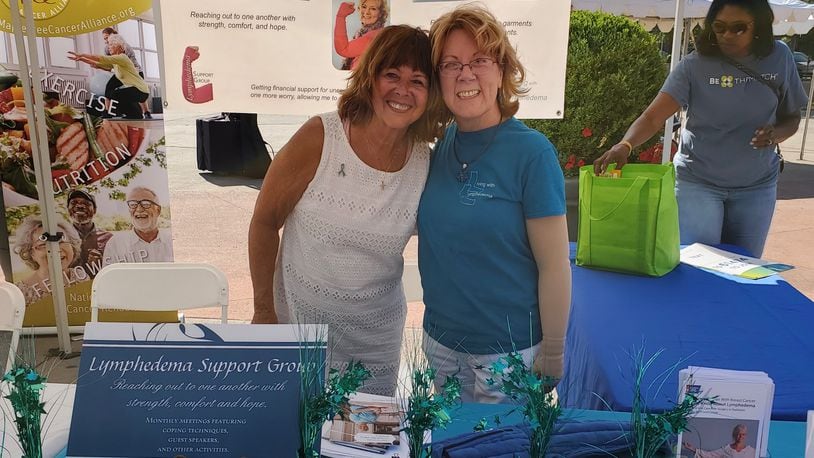“I got to still be here, so I’m going to make it worthwhile by trying to help others who have this same issue,” she said.
Schwab was given a 17% chance of survival after she was diagnosed with cancer in 2005. She underwent chemotherapy and multiple surgeries and has been in remission since 2007. However, she said that 40% of breast cancer patients eventually get lymphedema, which she described as a buildup of fluid below the skin caused by a weak or damaged lymphatic system.
The support group holds monthly meetings, but Schwab often responds to people who are looking for help and resources. She can be reached at lymphedema.sg@gmail.com.
“Nine times out of ten, they’ve been misdiagnosed, undiagnosed or just dismissed,” said Schwab, 68, of Bethel Twp. in Miami County.
Schwab’s lymphedema presents in her left arm and hand, but she keeps it under control with a pneumatic pump and compression garments that she uses almost 24 hours a day. Managing the incurable disease can significantly slow its progression, but lymphedema uncontrolled can cause irreversible damage and permanent disabilities.
Schwab also is involved in the nonprofit Lymphedema Advocacy Group, supporting the passage of a bill in Congress that would allow Medicare to cover the cost of compression garments, which need to be regularly replaced when the elastic wears out. Some people can use over-the counter garments, while others need theirs custom-made, she said.
Passage of the Lymphedema Treatment Act would not only save Medicare millions of dollars each year in hospital bills, but also improve the quality of life for people with the condition, she said.
“Meanwhile I see friends getting worse and worse and getting more and more disabled because they can’t afford compression,” she said.
Sharon Dodds was diagnosed with both lymphedema and lipedema, after suffering from pain for years. A single custom-made compression sock – not even a pair, she said – can cost $200, while other pieces come with a price tag of $1,000.
Schwab provides education, comfort and connections, showing others their next steps, said Dodds, who nominated Schwab as a Dayton Daily News Community Gem. That support is imperative with a chronic illness, she said.
“She provides some validity, some understanding, that it is real and it’s not in my head,” said Dodds, of Xenia, who met Schwab about a year ago through their mutual legislative advocacy.
An estimated 3 million to 5 million people live with lymphedema in the U.S., Schwab said. It is common, but it is often undiagnosed. Schwab is helping to reduce the suffering of those with the disease through her work with the support group and by advocating for legislation.
“Being able to keep people unhospitalized – that’s big,” she said.
About the Author
